Dentist Reputation Management: 5-Star Guide to Review Management for Dentists

(This post was originally published April 1, 2017 and was extensively updated on September 27, 2021)
Key Takeaways
- Focus on Google first: Most important platform for SEO and new patient discovery
- Ask and make it easy: Most patients won't review unless prompted—use short URLs, QR codes, and email requests
- Respond to all reviews: Brief, professional responses show you care (positive and negative)
- HIPAA compliance: Never discuss specific treatments or confirm patient relationships in public responses
- Yelp filters 25% of reviews: Focus on patients with established Yelp accounts for better filtering odds
Your reputation as a dentist is the most valuable thing in determining your ability to attract new patients and build a successful practice. You might think that your reputation is out of your control, but the truth is, there are many things you can do to build a strong reputation.
At Titan Web Agency, we work with dentists every day to help them create a strong online presence, improve their reputation, and give prospective patients the information they need to choose their practices over their competitors.
With that in mind, let’s talk about dentist reputation management. Here’s what you need to know.
What is Dentist Reputation Management?
Dentist reputation management is the process of influencing what people think when they hear your name or the name of your practice. When someone is new to the area, they are unlikely to have any information about local dentists. As they begin to ask around and read reviews, they will likely form opinions quickly.
Reputation management may include branding, content marketing, review requests and management, and community activity. The goal is to have positive feelings associated with your practice when people hear it mentioned.
Why is Dental Reputation Management Important?
Your practice’s reputation can help you to grow and become the most successful practice in your area or it can lead to new patients choosing your competitors instead of you. Let’s talk about some of the specific ways that dental reputation management is important.
Dental Reputation Management Improves SEO Performance for Your Website
Since reputation management includes creating a consistent brand online and managing reviews, it can also help improve the SEO performance of your website. For example, standardizing your listings across all review platforms ensures that anybody who searches for your practice will find you and your website. You want patients who are new to the area to find you instead of your competitors, and reputation management can play a big role in raising your online profile.
Dental Reputation Management Campaigns Drive New Patient Growth
New patients aren’t going to choose your practice if your reputation isn’t both positive and consistent. When you start to work on your reputation, you may find contradictory or confusing information about your practice. However, once you have solidified your online presence and created a memorable dental brand, new patients will be more likely to find and choose your practice.
Proactive Dental Reputation Management Can Help Avoid Negative Publicity
Negative publicity can harm your brand and reputation. While the occasional negative review may show up, having a robust system of reputation management can help minimize the impact and avoid the kind of negative publicity that can build if you don’t prioritize managing your reputation.
Dental Review Sites Dental Practices Should Be Monitoring
Before we get into the specifics of how to manage your reviews, let’s talk about the review sites that you should be monitoring.
Google Reviews
Google reviews are linked to Google, the world’s largest search engine, and that makes them important to any business, including dental practices. If you have many positive reviews on Google, your website and practice will get far more attention than they would without them.
To get Google reviews, you will need to claim your Google business listing and verify that you are the owner of the business. Verification is essential because it allows your business information to appear on Google and for your business to appear on Google Maps. Google will provide you with a short URL that you can give to patients to make it easy for them to leave reviews of you and your practice.
Read more about claiming and setting up your Google Business Profile.
It should be noted that if you want to use Local Service Ads for your dental practice, (LSA's) having a claimed Google Business Profile and reviews on your profile is a requirement before you are able to enroll. While it isn't required for traditional dental PPC, it is required for the LSA's
Healthgrades
Healthgrades has over 10 million patient reviews on its website, making it one of the largest review sites dedicated solely to reviewing medical professionals. Users can search for dentists based on their ratings, locations, or the services they provide.
You may already have a listing on Healthgrades if patients have reviewed you there. You will need to claim your free profile and provide relevant information to help people find you. You can do that on the Healthgrades website, here.
Vitals
Vitals claims to be the largest online database of patient reviews. On their website, patients can search healthcare providers by specialty, location, and the insurance they accept. They also have an array of informational videos about medical conditions and procedures for patients to view. Since it features the top-rated providers based on visitors’ locations, it is a good site to monitor.
Chances are, your practice already has reviews on Vitals. If it does, you can click the “Claim My Profile” button next to your name and complete the required information to claim your profile. You can’t delete negative reviews, but you can report them as abusive if necessary.
Zocdoc
Zocdoc is a well-known doctor and dentist review site. Like many of the others we have mentioned so far, you can use it to search providers by location, specialty, and insurance accepted. Top-rated providers are featured on their homepage. Zocdoc stands out from other sites because they also have a “book an appointment” link that makes it easy for prospective patients to choose you as their dentist.
Claiming your profile on Zocdoc is easy. Simply click the “List your practice on Zocdoc” button at the top, right-hand corner of the home page. You will be prompted to enter some basic information about yourself, and then a Zocdoc representative will contact you.
Dentistry.com
Dentistry.com has an online database of thousands of dentists and dental providers nationwide. As they are dedicated only to dentists, the site is the go-to resource for many people when they are in search of dentists. Patients can search dentists by location, and they also have an easy-to-navigate menu to search based on the type of treatment needed, including emergency dentist care. You can find your practice on Dentistry.com and claim your listing here. Once you are listed, you can ask patients to leave reviews. The more reviews you get, the more likely it is that your practice will be featured when people search for your location.
Opencare
Opencare is another site dedicated to helping patients check dentists’ reputations and find the best dentist for their needs. What sets Opencare apart is that it vets dental practices before listing them, offering patients an added layer of protection when they are searching for a new provider.
You can begin the process of getting listed on Opencare through their provider portal here. To qualify, you must have a track record of receiving excellent reviews online and no history of malpractice. You will need to provide basic information about your practice, including what dentist management software you use. We should note that Opencare works as a referral service, meaning that you pay a fee for any new patient who books a review through the website.
Yelp
Yelp is considered by many to be the go-to place to search for online reviews of local businesses. While any type of business may have a Yelp listing, dentists are often listed there, and patients may use the site to find new providers. They prioritize practices that have verified listings.
Claiming your Yelp listing is easy. You can start by clicking here. You will be prompted to enter information about your business. Once your listing is verified, you should add as much information as possible, including your location, hours, services, and photographs.
Dentist Reputation Management: Ways to Start Building Online Dental Practice Reviews
Now, let’s get into the specifics of how dentists can generate positive online reviews. Here are nine easy and effective strategies to help you get started.
1. Ask for reviews
Sometimes getting what you want is as simple as asking. It may not even occur to satisfied customers to create an online review of your business unless you make them aware of the possibility.
Most patients, whether they are long-term or visiting you for the first time, will comply with your request for any number of reasons. They may want to genuinely help you out or want to let other people know that they had a great experience with you. They may also feel a little guilty if they don’t comply. You are not trying to guilt them, of course, but after you have cared for them, they may feel a sense of obligation.
2. Make it easy
Even if your service is spectacular, most patients won’t go out of their way to leave positive feedback, so it’s essential to make it easy by strategically using patient feedback in dentistry to guide and strengthen your marketing efforts.
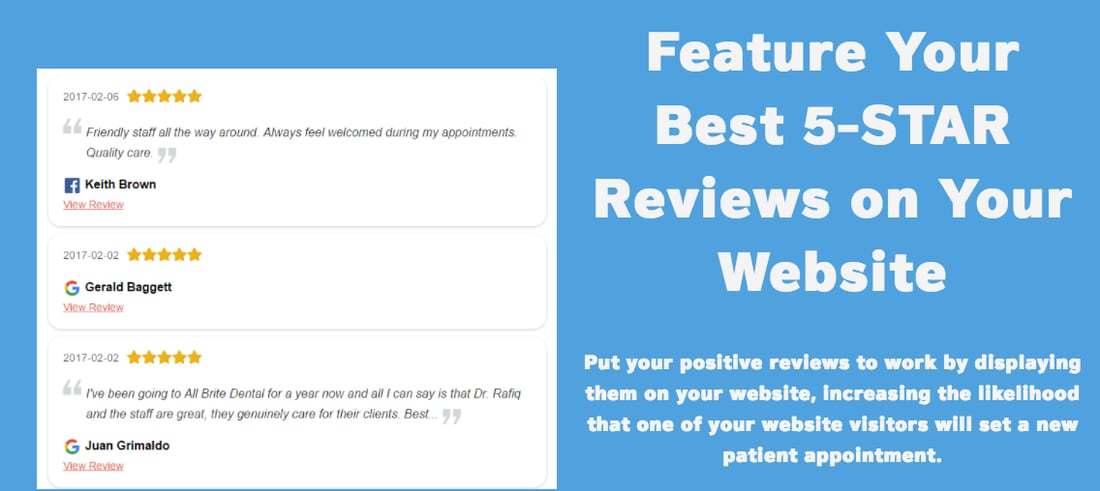
Your best reviews should be featured prominently on your website. A review system such as Titan Web Agency's MyReview can do that. Contact us to learn more.
There are a couple of ways to do this. If you want to go old-school, you could provide in-office forms for patients to fill out so that you can post them on your website as testimonials. This is a great way to encourage rave reviews from patients who are not online or who will forget as soon as they leave your office.
You can also add patients to your email list and then send them “review requests” that only require them to click a button or a link to get to your review page. Other options include offering links via your website and dental practice social media profile and sending "call to action" reminders for satisfied patients to post reviews (see example below).

It also helps if you keep the review process short and simple. Your emails or other posts should let patients know that writing a review will only take a few minutes of their time.
Use a short URL and QR code to drive customers to a review landing page accessible even from their mobile device. Give them choices and guidance to make the task easier. For example, showing customers exactly how to leave a review on a given site or where they can log in with Facebook and leave a review without creating an account.
3. Monitor and moderate
Building up an online portfolio of positive reviews requires you to weed out those that are negative, and this relies on your ability to monitor and moderate comments.
Since you can retain the right not to post comments, this is easily done on your website and any other platforms you control. But for third-party review sites, you may have more trouble.
Your best bet is to monitor for negative reviews so that you can contact dissatisfied customers, find ways to rectify a bad experience, and turn them into positive reviews. Fraudulent reviews can be reported to third-party monitors, and they can be convinced to remove them.
Don't forget, you can also tip the scales back in your favor by drowning out negative reviews with positive reviews (keep reading to learn how to get those) and dental SEO. For example, keyword-optimized blog posts you post on your website. The most current postings will gain more traction with search bots.
4. Learn to spot fakes
Competitors, disgruntled ex-employees, or anyone seeking to harm your business could post fraudulent reviews. When you uncover such reviews, it is best to report them to the proper authorities (site moderators) to have them removed.
5. Address concerns
You may not like negative reviews, but in some cases, they can provide you with an opportunity to improve your business. When dissatisfied customers voice issues with your business, you can contact them directly to improve their personal experience (hopefully reversing their negative review and replacing it with a positive one).
You can also improve your business practices in general, potentially providing better service to current and future patients while also avoiding similar bad reviews in the future.
6. Go the extra mile
Encouraging positive reviews for your practice will only be successful if you earn them, so getting positive feedback starts with providing excellent service. While merely adequate service isn’t likely to earn you rave reviews, patients who are impressed might be more willing to go out of their way to post a review.
The way to make this happen is by going the extra mile whenever possible. Be accommodating with your schedule when you can, make sure your staff is always polite, friendly, and helpful, and do whatever you can to make sure patients have a productive and enjoyable visit.
7. Get patients invested
When you personalize your services and your website and engage patients on an emotional level, you are much more likely to encourage positive reviews and discourage negative postings. After all, most consumers are willing to forgive a lot if they have a strong emotional attachment to a business and its staff.
8. Choose rating sites to endorse
When you ask patients for reviews, it is best to refer them to a site where they can easily post. Take the time to research rating sites and find the ones that offer reputable services and policies you feel comfortable endorsing. As mentioned, Yelp is an important one to start with.
After you have decided which rating sites you want to endorse, create a Reviews page on your website (see example below) with links to your profiles on these sites. As mentioned in our guest post for Grade Us, a review page is a great central place to send customers to rate you on all the sites you endorse.

A review page like this one can dramatically increase your dental practice reviews.
9. Build social profiles
Your website will provide the hub of your online presence, but you need to branch out even further. While you probably understand the importance of creating profiles on social media sites like Facebook, Twitter, and Pinterest, you might not realize that there are other types of profiles you should focus on.
Sites like Yelp and WebMD allow you to input information about your practice, including contact information, a link to your website, and photos. All this makes it easier for satisfied patients to find you and leave reviews.
In some cases, you can even provide credentials and other pertinent information. Just make sure to check these profiles periodically to respond to comments.
10. Hire a marketing company to help with reviews
Anyone running or starting a dental practice is probably more concerned with expending time and effort on behalf of patients than dealing with online reviews. However, neglecting your online presence is one of the common digital marketing mistakes that can impact your practice’s reputation and growth. Although, just like you probably pay for SEO for your dental practice and online marketing for healthcare professionals, you can pay a service provider to monitor and manage your online presence.
A reputation management service will look for negative postings associated with your business and find ways to counteract them, helping you to improve your online image and build up a portfolio of positive online reviews.
However, the reputation management service you hire must be, well, reputable. As the Wall Street Journal reports, many reputation management services use shady and even illegal practices that can backfire on your business.
Online Reputation Management for Dentists: Best Practices
Dentists must know how to manage their reviews to maximize the benefits of good reviews and minimize the damage caused by bad reviews. As mentioned, one way to do this is by responding to reviews. Let’s go over some appropriate ways to do this.
How to respond to positive reviews
Now that you are starting to monitor your reviews across the web, the next questions are these:
How should I respond to reviews? Should I respond to my online reviews?
First, let’s discuss how you should respond to positive reviews.
To answer the question of whether a dentist should publicly respond to positive reviews, the answer is yes if you follow a few important rules:
- Thank the patient for taking the time to review you and let them know you value their feedback
- Keep your response brief and professional
- Don't discuss any personal information about the patient or the service you provided them
- Don't offer any free service or another benefit as a thank you for the positive review
- Don't ask anything of the reviewer — for example, to spread the word about your practice
- Don’t defend yourself from a minor criticism contained in the overall positive review (this can create a bad image in the reviewer’s mind)
When a dentist takes the time to respond politely to a positive review, it shows people (not just the person you are responding to, but everyone reading your profile) that you care about patient opinions and value their feedback.
Don’t go overboard with a long response or you will come across as overbearing and unprofessional. If you want to engage in a longer conversation with the patient, you can contact them privately.
Examples: Good and bad responses to a positive dentist review
Here’s an example of a good response to a positive review:
"Thank you for taking the time to review us. 123 Dental values all feedback and use it to improve our services. Have an amazing day!"
The response acknowledges the reviewer but does not violate the HIPAA Privacy Rule, which prohibits you from divulging anything about the patient’s health information, including the fact that you treated them.
Now, let’s look at an example of a bad response to a positive review:
"George, you are one of my favorite patients, and I’m glad you liked the crowns I did for you. Though I don’t think I was really five minutes late. Still, I’d like to thank you for leaving this review with a free tooth whitening session."
This type of response is not recommended because it provides personal information about the patient, which is a violation of HIPAA. Offering free teeth whitening could be construed as a bribe or payment for a positive review. The dentist also directly disputes a criticism contained in the review, which is another no-no.
Here are some great responses from Kirkland Family Dentistry regarding their Google Business Profile listing.
How to respond to negative reviews
Responding to negative reviews is a bit more sensitive. You must be careful when doing this, or you will make the situation worse and potentially even get yourself in some legal trouble.
That said, in most cases, dentists should respond to negative reviews as this allows you to show that you care and to rectify the situation. Although remember, you need to make sure you respond sensitively.
As with responding to positive reviews, when responding to negative reviews, you should keep your response brief, professional, and general (not specific to the patient). Let them know you value their feedback and that you strive to provide a positive experience, then tell them how they can contact you.
Follow these tips when responding to a negative review of your practice:
- Never respond when angry or in an argumentative manner.
- Don't discuss anything specific about the patient’s treatment as this puts you in violation of HIPAA rules.
- Don't respond at length or multiple times, as this draws more attention to the negative comment.
- Don't offer any free service or other benefit as a thank you for the positive review
- Don't respond at all to "troll" or spam comments (people who are not even patients or completely making things up). These comments likely violate the rules of the review site and you should be able to have them removed by contacting the site’s admin.
After responding to a negative review, it is good practice to follow up with a private message or phone call. While you shouldn’t directly ask someone to remove a negative review, oftentimes if you go the extra mile to make the situation right, the reviewer will remove their negative review or change the review on their own.
If the reviewer makes inflammatory accusations about your medical services or qualifications — for example, accusing you of medical malpractice — then you should not respond at all and talk to legal counsel about how to handle such allegations. No matter how false or outlandish a patient review is, remember that a reactionary response will only make things worse.
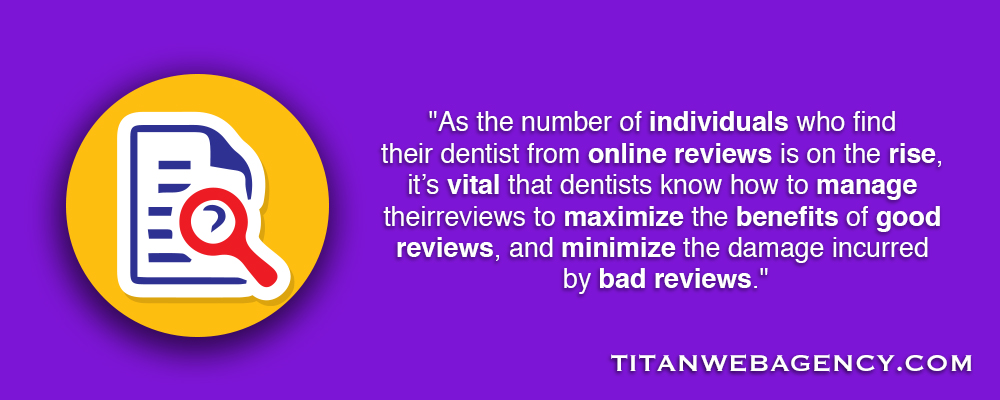
Examples: Good and bad responses to a negative dentist review
Here is an example of a good response to a negative review:
Thank you for your feedback. Here at 123 Dental, we want every patient to have an exceptional experience and we take complaints very seriously. Individuals with issues or concerns are advised to contact us immediately at xxx-xxx-xxxx so we can work to resolve the problem.
This response is brief and professional. While it demonstrates concern, it does not admit any wrongdoing on your part, or even that you treated the patient in question.
By contrast, here’s an example of a bad response to a negative review:
Amy, you are completely wrong here. You told me you were very satisfied with your dental implants, and if you were unhappy you should have said something. Unbelievable! I am a terrific dentist and have the right to sue people who make such accusations.
This response is bad because it discusses the patient’s medical treatments and displays anger. This will draw more attention to the negative review, make you look unprofessional, and potentially even have legal ramifications for violating HIPAA.
The example below shows precisely what not to do. Don't be like this guy! Instead, take a breath, count to 10, or do whatever you need to so you can respond rationally.
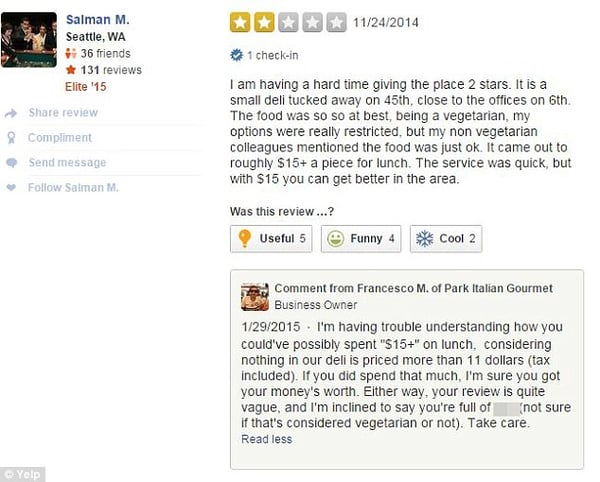
What about neutral reviews?
Not all dental practice reviews are purely positive or negative. Some are neutral – not too impressed, but no major complaints. Contrary to what many business owners think, neutral reviews require a response, too.
Why do you need to respond to neutral online reviews of your dental practice? Because these reviewers can be easily won over if you handle them right.
Andrew McDermott, author of Hook: Why Websites Fail to Make Money recommends that medical professionals spend 60 percent of their time on neutral reviews, doing their best to convert them to positives. According to McDermott, you should spend 30 percent of your remaining time on negative and 10 percent on positive reviews.
With neutral reviews, you should respond to the reviewer as you would with a positive review – thank them for their review and let them know you will use their feedback to improve your practice.
Then, respond privately as you would with a negative review. Offer something to convert them to a fan and get them back in the office, whether that’s a free whitening treatment, cleaning, or something else. Just remember not to make this offer in the public comments.
More online review tips for dentists
Here are a few more things to keep in mind in terms of responding to patient reviews and improving your review profile in general.
- Use a real photo of yourself (the dentist) in your review profile
Using a high-quality photo of yourself in your online profiles adds a personal touch to a dentist’s review responses.

- Use constructive criticism to improve your practice and services.
- Try to get patients who leave negative reviews back in the office to show them the issue is fixed.
- Let your patients know how they can review you online.
- Personally thank patients (offline) for leaving positive reviews
- Share positive reviews on your website and social media accounts (with the patient’s written consent).
- Follow the guidelines for responding to reviews, which may vary from site to site (here are Yelp’s guidelines for responding to reviews, and here are some tips from Google Business Profile).
One of the great boons for business owners in the digital age is that you know what your customers are saying about your company, and you can participate in the conversation.
Knowing what customers are saying about your business provides regular opportunities to demonstrate your company’s level of care and service in how you respond.
Dealing with an unhappy customer in public may be unnerving and uncomfortable, but it forces you to provide top-notch customer service. When done right, public responses from your company display how seriously you take your service and your customers, often alleviating fears that new prospects have about using a new company.
Perfecting Your Dental Practice’s Yelp Presence
Some dentists might wistfully remember a time before Yelp when a few bad online reviews didn’t have the power to take down your dentistry practice. But on the other hand, Yelp can be a useful tool for dentists who want to manage their online reputation and attract new dental patients.
Yelp is currently the most popular online review site for finding dentists, doctors, and other healthcare professionals. Follow these five simple steps to take control of your Yelp profile today and start getting those positive reviews that will make patients flock to your practice. Also, keep in mind that most of these tips will be useful for managing reviews on other sites!
1. Claim and start managing your Yelp profile
The first thing you need to do to start getting positive Yelp reviews as a dentist is to claim your Yelp profile. You have probably already done this, but in case you haven’t, follow Yelp’s instructions to claim your business page.
If your practice has multiple locations, make sure to claim those locations too, as Yelp views different locations as separate businesses. Do this by going into your main Yelp business account and going to Account settings, then click on the Claim Another Business Section and click the Claim another business now link.
Next, you need to start optimizing your Yelp business page. This means that if your profile is not 100% filled out, you need to go in and complete as much information as you can. Be sure to include key information such as:
- Business name
- Business category
- Address
- Neighborhood
- Phone number
- Website
- Hours of operation
You want to consider the option to book an appointment through Yelp and you may want to mention the top insurance carriers you accept.
Additionally, you want to add appropriate multimedia, including a high-quality photo of the dentist, photos of your offices, and your practice logo.
Dentists should also take advantage of the opportunity to add a video to your Yelp profile. This is a great way to get people comfortable with you and your practice before they ever visit the office or even speak to you over the phone.
Now that your profile is all decked out, it is time to start managing those reviews. Make sure your account is set up so that you receive email notifications as reviews are posted. This way, you can monitor reviews and respond appropriately.
A good Yelp profile for a dentist has elements such as hours of operation, a high-quality picture of the dentist, your business logo, and your business address.
2. Respond appropriately to your reviews
Now that you have begun to monitor your reviews, you can start responding to reviews, both positive and negative.
The main thing to keep in mind when responding to Yelp reviews is that your responses should be brief and professional. Thank people for taking the time to review your practice, but never say anything personal about the patient or you will be in violation of HIPAA rules. Also, don’t offer them a freebie to thank them for their review or you will violate Yelp’s rules.
It may feel like you need to walk a thin line when responding to reviews, but it is still important that you respond to some or even most of your reviews, as this shows patients and potential patients that you are paying attention to their feedback.
When it comes to responding to negative reviews, again, keep your public responses short and brief. Do not lose your temper or write a lengthy, personal response with your side of the story. You can assure them that you will resolve any issues they may have experienced, but if the allegations are very inflammatory, it’s probably best not to respond publicly.
Whether someone left a positive or negative review, it’s generally good to follow up with a private message to the person who left the review. With a positive review, be sure to thank the reviewer, or you may even give them a call to show how much you care.
Your private response to a negative review can be tricky. However, many times, you will be able to get the person who left a negative review to change their rating if you work to resolve their problem.
Here’s an example of a bad dentist response to a negative Yelp review — Angry, long-winded, going into personal details … these are all no-nos.
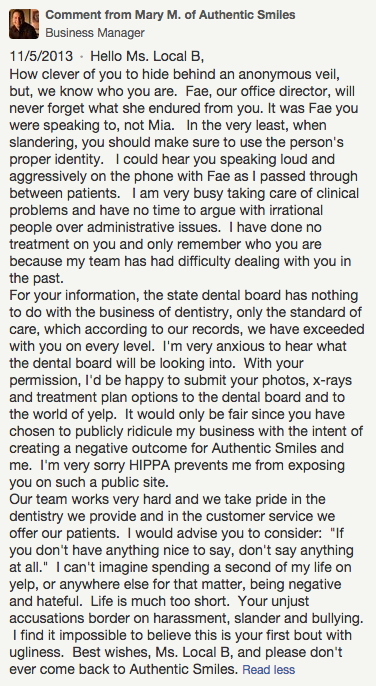
3. Understand Yelp’s “Recommended Reviews” system
One thing a dentist needs to keep in mind when monitoring their Yelp reviews is that many reviews are filtered out by Yelp’s very strict review filter. Unfortunately, this means that a lot of your positive reviews will end up as “not recommended,” i.e., hidden from view.
What makes a review get filtered out? Well, no one knows for sure.
Yelp says its recommendation software uses intelligent algorithms to decide if reviews should be recommended or not. Generally, it filters out reviews from people who have posted few or no other business reviews. Yelp says the software also filters out reviews that seem fake and those that have “unhelpful rants or raves.”
All in all, Yelp filters out about one-quarter of your reviews. You need to know that it’s not worth writing to Yelp about why a great review someone just wrote you got filtered out. Yelp says its employees cannot override the software to manually recommend a review.
However, that doesn’t mean there’s nothing you can do to get more of your good reviews through.
One important thing you can do is ask patients if they have a Yelp profile. If the patient says yes, you want to do everything you can to make sure they have a positive experience at your dental practice and let them know (in a non-pushy way) that your practice is on Yelp. This is because Yelp is more likely to feature a review from someone who already has an established account.
One of these “not recommended” dentist Yelp reviews was filtered out because the user had written no other reviews — but why is the other review not recommended? It’s hard to say.
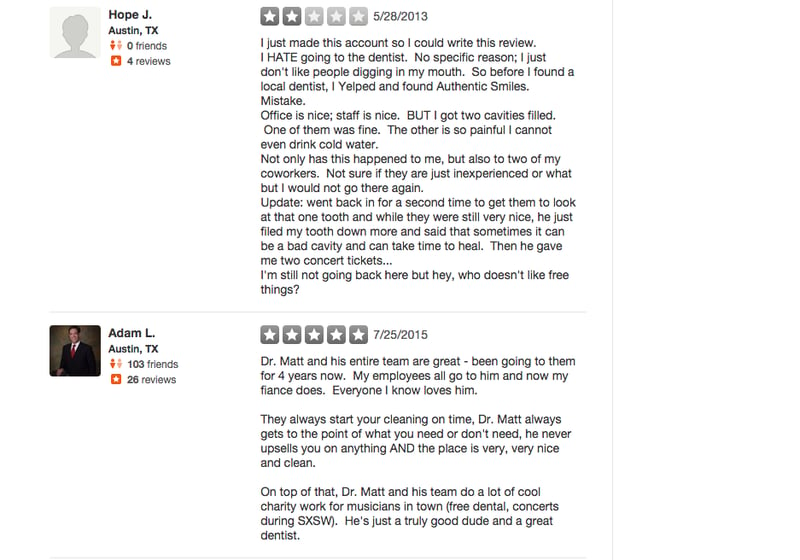
Inevitably, some of your positive reviews will get filtered out, and it will be disappointing. Try not to let it get to you; it happens to the best of us.
4. Encourage patients to review you on Google & Yelp
Yelp has a strict policy regarding review solicitation. You are not allowed to ask customers for reviews. Google is much more lenient; they encourage you to remind your patients to leave reviews.
That said, there are plenty of ways to encourage patients to leave you a review on Yelp that are completely within Yelp’s guidelines.
Here are some perfectly acceptable ways you can remind patients to review you on Yelp:
- Add Yelp signage at your business location (for example, a “Find us on Yelp” sign.)
- Share positive Yelp reviews on your social media accounts (with the reviewer’s permission)
- Add prominent buttons on your website that link to your Yelp profile
These things will remind patients with Yelp accounts to review you. You might even get creative and set up iPads in your waiting room with Yelp as the homepage.
Go to https://www.yelp.com/brand to get Yelp-branded materials you can use to remind patients to review you on Yelp.
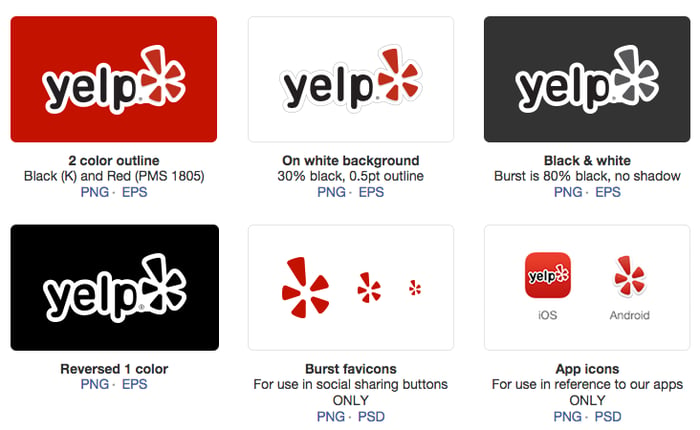
As previously mentioned, it is especially important to let patients who are active on Yelp know that you are on Yelp too. So, be sure to find out which of your regular patients are on Yelp and then try to work Yelp into the conversation next time they are in for a visit.
Ultimately, your online reputation as a dentist depends on having a great Yelp profile with lots of positive reviews. If you follow the steps on this list, you are well on your way to building a terrific Yelp presence.
If you need more help perfecting your Yelp profile or trying to minimize the impact of some damaging Yelp reviews, learn more about our review management system.
Our review management service is designed to help you get more positive reviews on Google, Yelp, Facebook, and any other review service that is important to your business.
To show you the power of reviews, check out the image below. Is there any question who you would immediately be drawn to and inclined to call if you needed an orthodontist in Salt Lake City?
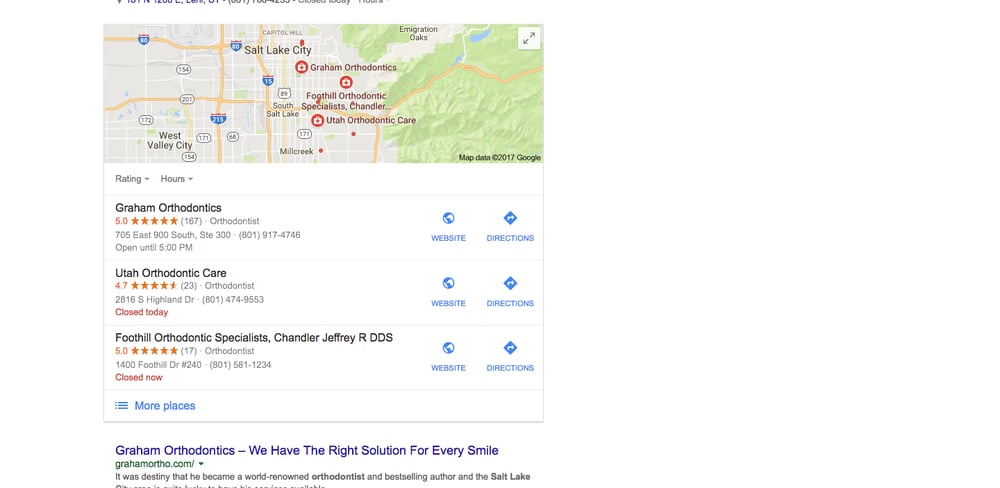
Dental Review Management Matters – Step Up Your Review Game!
Customers increasingly want to see what other customers say before they trust a business. Also, savvy consumers don’t trust glowing, 5-star reviews now that fake and fraudulent reviews are rampant.
Customer opinion is one of those domains that calls for letting go of control and instead embracing the kind of “soft control” that comes with communication as a discipline.
If you don't have the time to manage or respond to your online reviews, it's important to hire a reputation management agency to help you. Titan Web Agency can help!
Tyson Downs is the founder of Titan Web Agency, a company specializing in marketing for dental professionals. With an impressive track record of working with over 100 dental practices, Tyson has a deep understanding of the unique marketing needs within the dental industry.












.png)
.png)


